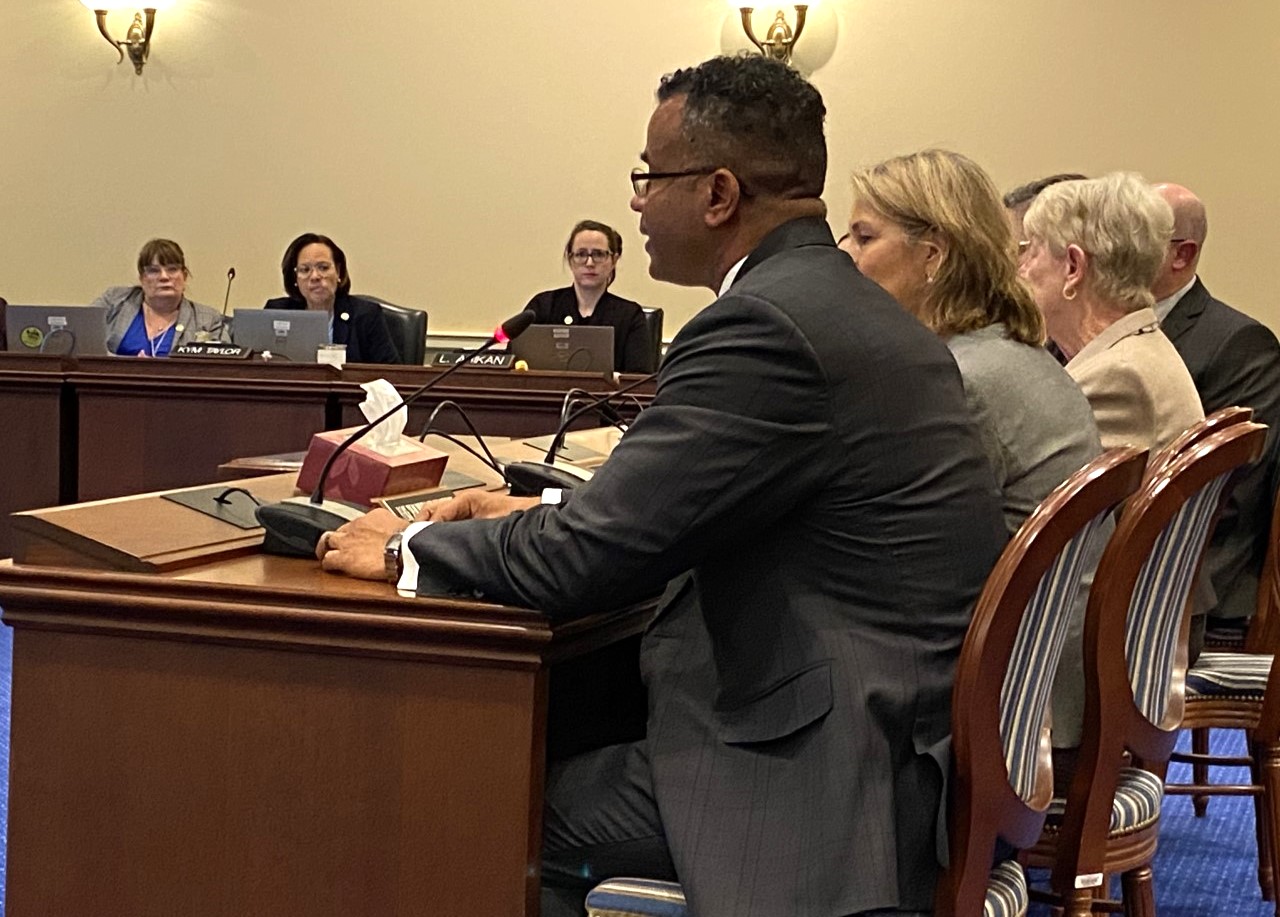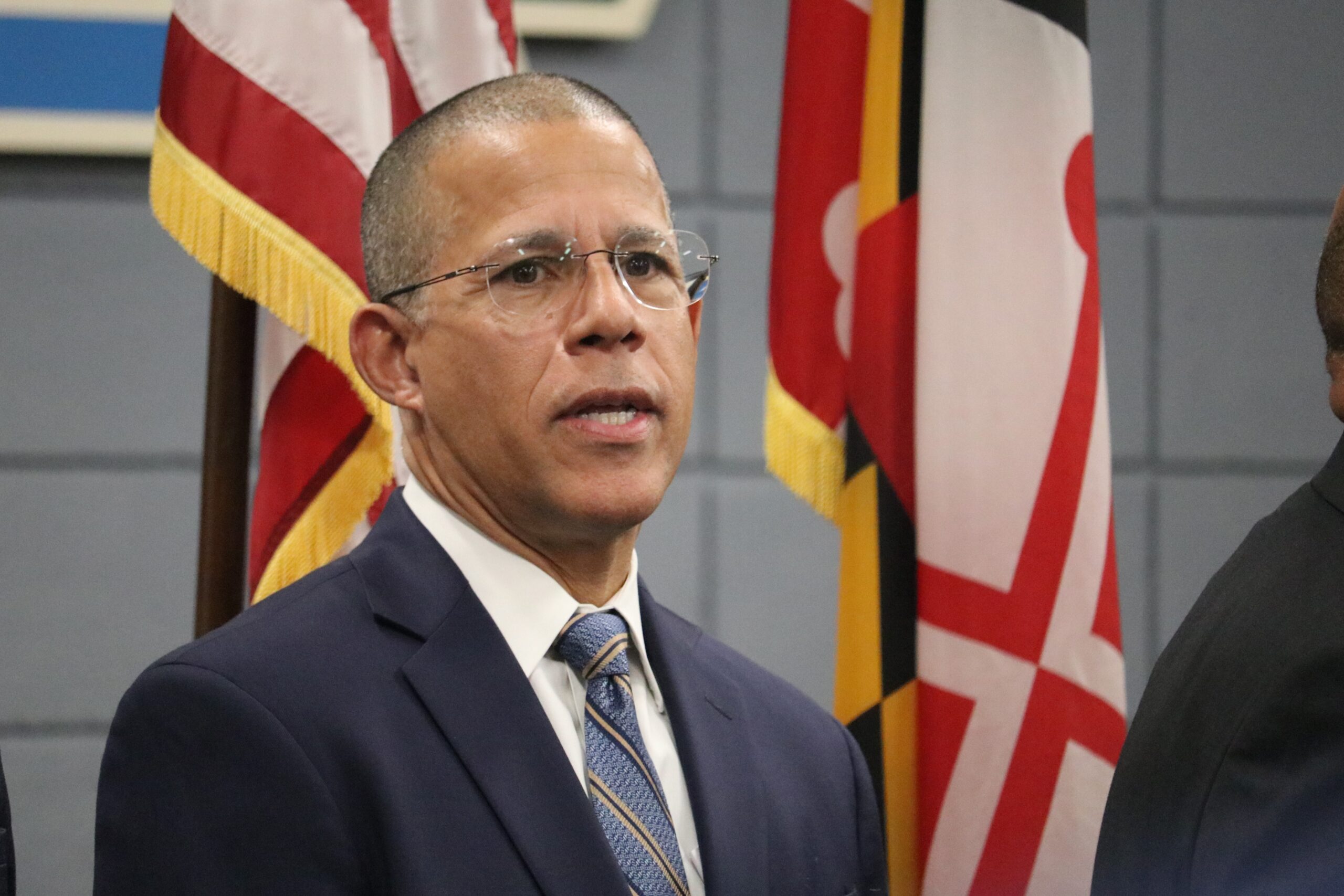Wilson leads emotional testimony from child sexual abuse survivors, advocates in House committee

Although Del. C.T. Wilson has testified for several years about surviving sexual abuse when he was a child, it still affects him emotionally.
On Thursday, the Charles County Democrat told the House Judiciary Committee how his adopted father — who worked as a kindergarten teacher, Cub Scout leader and junior pastor — physically and sexually abused him when he was 9- to 16-years-old.
Wilson received latitude from Judiciary Chair Luke Clippinger (D-Baltimore City) to speak longer than usually allowed, for about 13 minutes, on House Bill 1, which would eliminate a deadline for people to file a civil suit for sexual abuse against an alleged perpetrator.

Del. C.T. Wilson gives emotional testimony March 2 before House Judiciary Committee on legislation he’s sponsoring to allow survivors of child sexual abuse file a civil suit against their alleged perpetrators at any time. Photo by William J. Ford.
“I’m here to fight and try to do the right thing…” Wilson said as he occasionally sniffed through his testimony and noted that he’s “sitting here on yet the eve of another divorce.”
“When you get molested by someone who claims to love you, you realize soon it’s only those that’s closest to you that can cause you pain,” he said. “So you make sure you keep everyone at arm’s distance…”
Advocates and Wilson, who began this legislative push in 2017, are feeling hopeful because of two people: Attorney General Anthony Brown (D) and Sen. William C. Smith Jr. (D-Montgomery), who chairs the Senate Judicial Proceedings Committee.
Last week, Brown wrote an advice letter to Smith, who is sponsoring Senate Bill 686, which, like Wilson’s bill, would retroactively, as well as prospectively, repeal statutes of limitation on lawsuits by plaintiffs who claim they suffered child sexual abuse.
In the letter, Brown told Smith it is not clear how the Maryland Supreme Court would rule if the bill becomes law and its legality in challenged. But Brown wrote that he would in “good faith” defend the change in court.
Maryland lawmakers have debated since 2019 whether it would be unconstitutional to repeal a statute of repose included in the law passed in 2017, when Wilson negotiated with the Roman Catholic Church to increase the age limit for someone to sue from 25 to 38.
Opponents of the new bill argue that a statute of repose creates permanent immunity against any time-barred claims. Supporters of this year’s measure argue that the 2017 bill was never meant to establish a permanent immunity from future changes to state law on child sexual abuse claims.
Brown’s letter notes that the legislature has made changes to statutes of repose in the past, amending state law to include exceptions for asbestos cases due to the effect the mineral has on public health.
‘Help us’
Both the House and Senate bills pending this year would allow a person to file a suit at any time, but Smith’s bill also proposes to raise the limit on financial damages for a single plaintiff to $1.5 million for claims against private institutions and $850,000 for public institutions.
On Thursday, more than two dozen victims of child sexual abuse told the House Judiciary Committee their stories and voiced their support of Wilson’s legislation. Wilson said it would also allow plaintiffs, who were previously barred from making claims because they missed a deadline, to sue institutions that harbored sexual predators.
Paul Jan Zdunek, who grew up in East Baltimore, traveled from Los Angeles to testify that he was abused for three years by a troop leader with Boy Scouts of America. The abuse began when he was 8 years old and lasted three years, he said.
“This abuse included … unimaginable acts,” said Zdunek, 55, who works as an executive in the professional services industry. “To make me feel special, I was supplied with alcohol, rum and Coke to be exact, and shown porn magazines and porn videos.”
He also endured psychological and sexual abuse by a Catholic school teacher between the sixth and ninth grades and again as a teenager by a man in a Catholic church choir.
“I’m here to shed light on the statute of limitations technicality that might be re-abusing your own son or daughter, your mother or father, or even your own spouse,” he said. “There’s no cap on my suffering. There should be no cap on the damages. All of us grown-up children are depending on you to help us.”
Carey Silverman, an attorney with the American Tort Reform Association, testified last week before the Senate Judiciary Committee and opposed the legislation for entirely eliminating the statute of limitations.
He testified similarly Thursday and called the proposal “unprecedented in Maryland law” and said that civil claims should be filed within a finite period.
The Maryland Catholic Conference, which serves as the public policy representative of the three archdioceses serving the state, issued a statement Thursday opposing the legislation and contending that seeking to retroactively revive claims that are currently time-barred “is unconstitutional.”
“We have noted in connection with past legislation that eliminating the civil statute of limitations retroactively raises serious equity concerns and is particularly unnecessary in Maryland…” read the statement. “Maryland is one of few states that have no statute of limitations for felonies, and thus perpetrators of sexual abuse can be rooted out and victims can have their day in court at any time until the death of the perpetrator, regardless of how long ago the sexual abuse occurred.”
The statement comes as the attorney general’s office prepares the release of a redacted 456-page report from a grand jury that found 600 victims of clergy sexual abuse.




 Creative Commons Attribution
Creative Commons Attribution